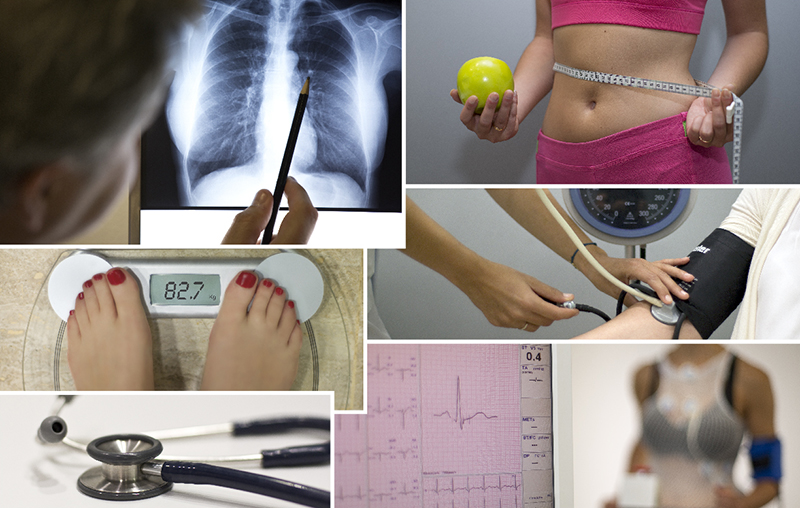
 Diagnostic Units
Diagnostic Units
Health Check-up
The health check-up provides can identify measures to prevent the onset of disease, such as risk factor reduction. It can also stop its progress and reduce its consequences once established.Why do we need a check-up?
The prevention of disease, early diagnosis and treatment are the best method to achieve a longer and healthier life.
The checks are useful for:
- The study and treatment of symptoms that may arise.
- The early detection of disease, when they are more easily curable.
- The assessment and treatment of risk factors that can lead to diseases in the future.
¿Who should get a check-up?
The program checkups is aimed at:
- People who have no symptoms but want to know their health status and potential risk factors.
- People who have symptoms, on regular treatment or not, and want to assess the impact of their disease on other organ systems and prevent future diseases.
Why conduct a check on CMI?
Our centre has a multidisciplinary team of specialists in various fields such as internal medicine, cardiology, neurology, vascular, nephrology and nutrition. A continuous exchange of medical information among the members of the team can lead to the best possible treatment of the medical problems identified by the medical check-up.
What is a medical checkup?
The check-up includes a detailed clinical history, physical examination, blood tests and urine tests and an electrocardiogram. Subsequently, additional tests will be requested in a personalised manner to target the needs of the patient evaluated.
Check-up types:
- Full clinical check-up.
- Cardiovascular check-up.
Cardiovascular check-up
¿When you should undergo a cardiovascular check-up?
Men should have a cardiac check-up from the age of 45, and women aged above 50.
What are the objectives of Cardiovascular Screening Program?
- To Identify the presence of cardiovascular risk factors.
- To detect the presence of cardiovascular disease early.
- To promote heart-healthy life styles.
- To develop an individualized cardiovascular prevention plan.
What does the Cardiovascular Screening Program include?
Initial phase:
- Evaluation of the clinical history with family, personal history and surgical interventions.
- Physical examination, determination of weight, height, waist circumference and blood pressure.
- Blood and urine tests.
After the initial phase, an estimation of a cardiovascular risk will be developed through a system based on the combination of cardiovascular risk factors (> 20% represent a high risk, between 10 to 20% a moderate risk <10% is considered low risk). Diagnostic tests
- Electrocardiogram: to identify the presence of heart block, conduction disorders, arrhythmias and indirect signs of heart disease.
- Colour Doppler echocardiography: analyzes the anatomy of the heart chambers, morphology and function of valves and heart contractility.
- Exercise Stress Test: ECG changes can suggest of coronary artery disease. It also helps to assess the blood pressure and heart rate response to exercise.
- Coronary CT: is a non-invasive technique performed by a thoracic scanner that allows early detection of atherosclerotic disease. This is a very sensitive test to identify calcium deposits in the coronary arteries method.
- Cardiac Magnetic Resonance shows a very good picture of the cardiac anatomy, allowing studies for detection of abnormal heart morphology, heart function and coronary perfusion.
- Doppler TSA analyzes the presence of atherosclerotic plaques and / or blockage of the carotid and vertebral arteries.
- Vascular Doppler studies of limbs can analyze the plates and/or blockage of the arteries of the legs.
- Abdominal ultrasound can calculate the diameter of the abdominal aorta.
Evaluation Phase:
- Review of results.
- Development of a customized report of cardiovascular risk.
- Set conduct and / or therapeutic treatment directed.
- Monitoring to assess the impact of the delivered recommendations.
Can cardiovascular risk be reduced?
Risk factors potentiate each other. The higher the number of cardiovascular risk factors is, the greater is the risk of developing a cardiovascular event in the future. It is therefore important to identify them and to monitor the regularly. However, above the control of each of them, it is essential to take measures for a “Heart-Friendly Life”.
Are you at risk for a heart attack?
Risk Factors such as smoking, diabetes, cholesterol and blood pressure can affect your cardiovascular health.
Determine your risk Cardiovascular with one click.
×




